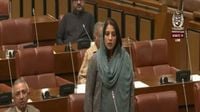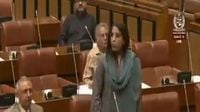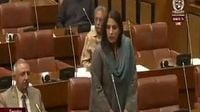In a shocking escalation of rhetoric between India and Pakistan, Pakistani Senator Palwasha Mohammad Zai Khan delivered a provocative speech in Pakistan's Upper House on April 29, 2025, that has since gone viral. The speech, which came in the wake of the deadly Pahalgam terror attack that claimed at least 26 lives, included alarming declarations regarding the construction of a new Babri mosque in Ayodhya.
"The first brick of the new Babri mosque in Ayodhya will be laid by Pakistan Army soldiers, and the first azaan will be given by Army Chief Asim Munir himself," Khan stated, invoking the historical and contentious Babri mosque demolished in 1992. Her remarks not only stirred outrage but also amplified the already tense relations between the two nuclear-armed neighbors.
Khan, a member of the ruling Pakistan Peoples Party (PPP) and deputy information secretary, suggested that the current political climate is paving the way for a "Muslim government, specifically a Pakistani Muslim government, in the Indian subcontinent." She asserted, "There is no doubt, this enmity is not with Pakistan or Pakistanis; this is enmity against Muslims and against Islam." This statement reflects the deep-seated religious and nationalistic sentiments that continue to shape the discourse between the two countries.
Issuing a direct threat to India, Khan warned, "If any hand reaches toward us, then the symbol of their power, the Red Fort of Delhi, will witness a bloodshed that its walls have never seen, and its ramparts will testify to it for centuries to come." Such inflammatory language has raised concerns about potential escalations in violence.
In her speech, Khan emphasized that Pakistanis are not weak, asserting, "We are not wearing bangles." To bolster her stance, she quoted the late Venezuelan President Hugo Chávez, saying, "We have guns, we have arms, we have trees—and if the enemy tries anything, we will hang their corpses from our trees." This militaristic rhetoric has drawn significant attention on social media platforms, with many users expressing outrage.
Notably, Khan also attempted to draw a religious divide within the Indian armed forces, claiming, "The Sikh army will not attack Pakistan because it’s the land of Guru Nanak for them." Her comments have been interpreted as an effort to exploit religious sentiments to further polarize the already strained relations.
Adding to the tensions, PPP chief Bilawal Bhutto-Zardari made a statement regarding the Indus Waters Treaty, which India suspended following the Pahalgam attack. He declared, "The Indus is ours and will remain ours. Either our water will flow through it, or their (Indians') blood will." This declaration underscores the high-stakes nature of water resources in the region and the potential for conflict over them.
Prime Minister Narendra Modi, in response to the escalating situation, reportedly expressed full confidence in the Indian armed forces during a high-level security meeting, stating that they have complete freedom to decide the mode, targets, and response to any threats.
The backdrop to this heightened rhetoric is the Pahalgam terror attack on April 22, 2025, where terrorists linked to the Lashkar-e-Taiba opened fire on a group of tourists, resulting in multiple casualties. The attack has led to a series of diplomatic measures from India, including the suspension of the Indus Waters Treaty, reducing the strength of the Pakistan High Commission in India, and closing Indian airspace to Pakistani flights.
Pakistan has also responded by closing its airspace for Indian flights and has threatened to withdraw from the Shimla Agreement and other accords with India. This tit-for-tat response reflects the deteriorating diplomatic relations and the potential for further escalation.
As tensions continue to rise, Khan's remarks serve as a reminder of the fragile state of peace between India and Pakistan. The provocative nature of her speech, coupled with the ongoing violence and political maneuvering, raises concerns about the future of bilateral relations.
Palwasha Mohammad Zai Khan has been a prominent figure in Pakistani politics, serving in the Senate since March 2021, representing the province of Sindh on a women’s reserved seat. Her comments reflect a broader trend among Pakistani politicians to adopt increasingly aggressive rhetoric towards India, particularly in the wake of violent incidents.
The international community has been closely monitoring the situation, with calls for de-escalation and dialogue. However, the deeply entrenched historical grievances and ongoing violence pose significant challenges to peace efforts.
In conclusion, the recent statements made by Senator Palwasha Mohammad Zai Khan highlight the precarious nature of India-Pakistan relations. As both nations grapple with the implications of her inflammatory rhetoric, the potential for conflict remains a pressing concern.



